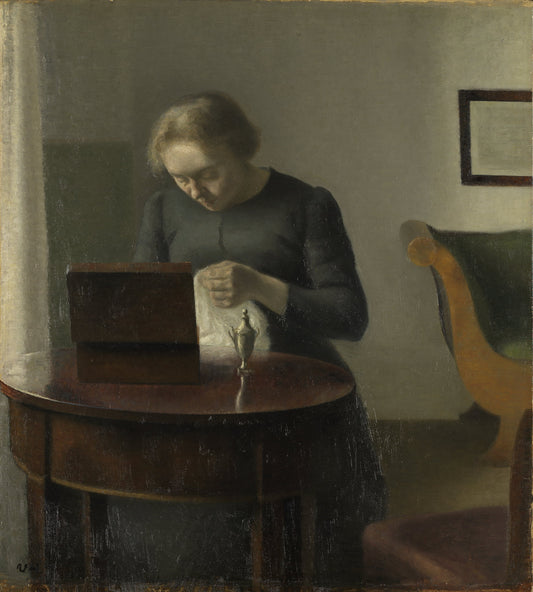Vilhelm Hammershøi
The artist's wife at the sewing table
The artist's wife at the sewing table
Couldn't load pickup availability
Art reproductions with authentic colors and details. Posters are printed on 230g Litho White Matt photo paper with white border and logo. Artprints are printed on 260g Museum Natural Rag 100% cotton paper without white border and logo. Produced to order in our own print lab. From our exclusive collaboration with the National Museum.
About the original:
Date: Probably 1897
Other titles: The Artist's Wife at a Sewing Table (ENG)
Designation: Painting
Material and technique: Oil on canvas
Technique: Oil
Material: Canvas
Dimensions: H 61 cm x W 54.5 cm
Subject: Visual arts
Classification: 532 - Visual arts
Type of motif: Portrait Interior
Genre
Photo: Børre Høstland
Shipping and returns
Shipping and returns
Shipping: We deliver to Scandinavia, the EU, the USA and several other countries. Please contact us if your country is not listed and we will try to arrange delivery.
Delivery time: 2-5 days within Norway, 7 days in Europe, 14 days globally.
Packaging: Our products are made to order and sent rolled in environmentally friendly packaging.
Customs Fees: International orders may be subject to customs fees, which are not included in shipping costs.
Return policy: You can return images within 14 days. See our returns page for more information.
Secure Payment: We never store your payment details. See our privacy policy for details.

See all works
-
The artist's wife at the sewing table
Vendor:Vilhelm HammershøiRegular price From 150,00 NOKRegular priceUnit price per -
The coin collector
Vendor:Vilhelm HammershøiRegular price From 150,00 NOKRegular priceUnit price per -
Landscape, early spring. Bernstorfvejen seen from Hellerupvej
Vendor:Vilhelm HammershøiRegular price From 150,00 NOKRegular priceUnit price per

Vilhelm Hammershøi
Vilhelm Hammershøi was a Danish artist known for his distinctive talent in painting. He showed his talent with the portrait of his sister in 1885. Hammershøi was inspired by the Danish art tradition and Dutch painters from the 17th century, especially Vermeer van Delft.
He is perhaps best known for his interior paintings, where he used a finely nuanced, grey-toned color palette to interpret the poetry in "quiet spaces". In these images, the lines were more important than the colors, and they reflected the refined Danish bourgeoisie. Hammershøi was the brother of Svend Hammershøi, and he studied at the art academy in Copenhagen from 1879 to 1884. He then studied under Peder S. Krøyer. Hammershøi also painted figure compositions such as "Job" (1888) and "Artemis" (1893-1894), as well as the large group picture of Thorvald Bindesbøll, Svend Hammershøi, Karl Madsen, Jens F. Willumsen and Carl V. Holsøe in the Thielska gallery in Stockholm ( 1901).
He was also skilled at painting architectural pictures. Hammershøi's art was met with opposition from the Academy circle, which led to the formation of Den frie utstelling in 1891 by a number of younger artists.





